The Cabinetmakers of Our Lives
Nice people
What do grandmothers, housekeepers, cooks and cabinet makers have in common?
It’s nice to have nice people at the house doing nice things.
On Thursday I signed an agreement with an ébéniste — a “cabinetmaker” — to repair doors, insulate/replace some windows, sand off old leaded paint, and repair or replace and paint shutters.
Next morning I sent him a deposit. Within a couple of hours he and his team of three were fussing with our woodwork. This was just the beginning of several weeks’ worth of tapping, sawing, sanding and painting.
It’s been a long time coming. Our kitchen project was delayed. Then we decided to do this. Then there were more delays. In the end we were kind of glad it took so long: we got to know the house before rushing into renovations.
It was getting old, though, living in an old house where everything was just... old. And cold.
The cabinetmaker (in America he’d be called a carpenter) got our business because someone in the international community recommended him. He proposed repairing windows rather than replacing them, which our other bidder had wanted to do. So he was cheaper, too.
Most importantly, when he came to view the house, the first thing he wanted to talk about was... my guitars. It turned out he plays at the local church on Sundays.
Then as we moved through each room, he shared, in passable English, a hundred things he noticed about the house that I hadn’t. Someone had, for example, tried to break in through the back door and window.
He’s a really sweet guy. He and his friendly team blew in like Maid Brigade and spread throughout the house. They spoke in serious tones — so intent were they that Mia stopped following them around. There was the sound of a saw outside. As each little job was finished, an industrial vacuum cleaned up the mess.
Before he left that evening, the cabinetmaker asked when he could come to take the shutters for repainting. Far as I’m concerned, he and his team can come every day and just hang out.
Today the bathroom door opens without scraping the floor. My office door shuts. The house seems warmer, even if it really isn’t. I’ve acutely experienced what experts in the coaching and mental health professions call “feeling good.”
I felt something similar
in the summer of 1974 when I went to Malaysia. My host had in his employ two Chinese housekeepers. Every day after a morning of swimming or playing squash or hiking or bicycling, I’d return to my room to find the previous day’s sweaty clothes washed, dried and carefully folded in my drawer.
when I was staying at my grandmother’s: I’d come to the kitchen in the morning to find waiting for me on the table an egg from the chicken house resting hot in an egg-cup; a segmented half-grapefruit; toast and butter; and a glass of juice.
and lying in bed Saturday morning in Islamabad, when I’d hear the sound of our live-in cook Iqbal grinding the beans for my coffee. (Susanne and I still sometimes cry “Iqbal!” when we feel like being spoiled.)
We miss you, Iqbal
Our house in Apt will never be just the way we want it. And after the cabinetmakers drove off that first day, my fine feeling dissipated, as all contentment inevitably must, when I began to worry about all the other stuff what needs fixing around the house. The decisions to be made. The money to be spent.
But life is tedium if we don’t reflect on those fleeting good feelings when — if we were very, very lucky — our grandmothers, housekeepers, cooks, cabinetmakers, and others did nice things to make things nicer.

